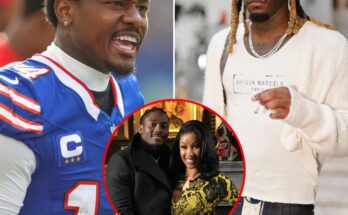In 2006, a photo shocked the world and spread across social media: a frail, malnourished Nigerian boy being given water and biscuits by a foreign woman. That image was not only a painful reminder of the millions of abandoned children in Africa, but also the beginning of a miraculous journey that would last nearly two decades.
The woman in the photo was Anja Ringgren Lovén, a Danish humanitarian (often mistakenly reported as British), founder of the non-profit organization DINNødhjælp. For years, she dedicated her life to rescuing Nigerian children who had been labeled as “witches” and abandoned on the streets.
The boy in the photo was only about two years old at the time. Rejected by his community, he had been wandering for months, emaciated and close to death. When Anja found him, she immediately brought him to her rescue center and gave him a new name:
Hope – with the belief that his life could change.
From little “Hope” to a vibrant young boy
Years later, the world saw another image that went viral: in 2013, Hope sat beside Anja, smiling brightly, healthy and full of life, wearing a sports jersey. The transformation touched millions of hearts and became proof of the power of love and persistence.
Hope was not only given food and shelter, but also the chance to go to school, to learn, and to dream of a future he had never thought possible. Anja often said:
“Every child deserves love, deserves life, and deserves to dream.” Hope became living proof of that belief.
Overcoming hardship to reach the university stage
Hope’s journey was never easy. He faced stigma, deep psychological wounds, and the challenge of catching up in education. But through his own determination – and Anja’s unwavering love – he kept improving step by step.
In 2025, the newest image once again brought tears to the eyes of millions: Hope, wearing his graduation gown, smiling brightly as he stood beside his “mother” Anja – the woman who had saved his life almost 20 years earlier. The starving, hopeless child had now become a university graduate, ready to open a new chapter in life.
A meaning beyond a personal story
Hope’s story is not only a miracle for one boy, but also a powerful reminder to the world. Across Africa and many other places, thousands of children are still being abandoned, abused, or trapped in extreme poverty. A timely intervention – even a small act of kindness – can change the course of an entire life.
As Anja once said: “I cannot save them all, but I can save the children I meet on my path.” With Hope, she did not just save a child – she gave the world a message: kindness can defeat cruelty, and love can make the impossible possible.
A future full of promise
Today, as Hope walked across the stage to receive his university degree, not only Anja but millions of people following his journey around the world felt deeply moved. This was not just one individual’s triumph – it was living proof of the power of faith, love, and perseverance.
From an abandoned child on the brink of death, Hope has grown into a symbol of hope itself – true to the name Anja gave him nearly two decades ago. His story will continue to inspire generations to come.
No One Came To This Veteran’s Funeral… Until A Phone Call Changed Everything
The phone rang on a quiet Tuesday afternoon. On the other end, a funeral home director spoke in a trembling voice:
“We have a 71-year-old Vietnam veteran. His name is Richard ‘Doc’ Patterson. He’s being cremated by the state—completely alone.”
Just another name on a government form.
When she tried to contact his children, the daughter said she was “too busy.” The son hung up the phone.
But this man wasn’t just anyone. He was a combat medic — a soldier who’d risked his life in the jungles of Vietnam to pull bleeding men from the dirt and patch them up under enemy fire. For 32 years, he served. Saved lives. Gave everything.
And now, at the end of it all, the world was ready to throw him away like he’d never existed.
The funeral director couldn’t accept that. So she started calling — veterans’ organizations, motorcycle clubs, churches. Most said they were sorry but couldn’t help.
Then, finally, she called us… and that call changed everything.
“He’s One of Ours.”
My name’s Jack Morrison, and I’ve been president of the Iron Brotherhood for 15 years. We’ve done charity rides for cancer patients, fundraisers for abused kids, and even funeral escorts for fallen officers. But this one… this one hit me right in the gut.
When the director told me, “He has no one,” I didn’t even hesitate.
“He’s a veteran,” I said. “He’s one of ours. We’ll be there.”
That night, I sent out a message across every biker group I knew:
“Vietnam vet. No family. Funeral this Friday. Let’s show up and make sure he’s not forgotten.”
I didn’t know what to expect. But what happened next… I’ll remember for the rest of my life.
The Call That Spread Like Wildfire
By the next morning, my phone wouldn’t stop buzzing. Riders were coming from everywhere — Tennessee, Georgia, Kentucky, even as far as Texas. Some rode through the night, sleeping in gas stations, just to make it in time.
By Thursday, the local news picked up the story: “Homeless Veteran to Be Buried Alone.”
Within hours, it went viral. Hundreds of strangers vowed online to attend the funeral of a man they’d never met.
Doc had been forgotten in life — but in death, he was becoming something bigger: a symbol of the quiet heroes who slip through the cracks.
The Day of the Funeral
When I pulled into the small funeral home that Friday, I froze. The parking lot was packed.
Fifty-three bikers stood in full club colors, our motorcycles lined up like soldiers. A full Army honor guard was there too, their uniforms pressed and shining in the midday sun. A Navy chaplain had driven three hours just to officiate.
And behind them — over two hundred people. Veterans, families, neighbors, even strangers from other states. Some were crying before the service even started.
The funeral director met me at the door, eyes glistening.
“I’ve done this job for 23 years,” she whispered. “I’ve never seen anything like this.”
The Man Who Remembered
The chapel was silent except for the hum of an old ceiling fan. The chaplain spoke about brotherhood, sacrifice, and the weight of a soldier’s duty. Then the honor guard folded the American flag — triangle by triangle — and placed it on the casket.
But there was no family member to receive it.
That’s when a frail old man in the back stood up, leaning on his cane.
“I knew Doc,” he said, voice shaking. “Da Nang, 1968. I was nineteen when I got hit in the stomach — bleeding out in a rice paddy. Doc ran through gunfire, carried me on his back, and saved my life.”
He reached into his coat and pulled out a faded photograph — a young medic, smiling faintly, a Red Cross armband around his sleeve.
“I’ve carried this picture for fifty-five years,” he said. “Last night, I saw his face on the news. I finally found the man who saved my life.”
The room went completely silent — except for the sound of muffled sobs.
The Stories Kept Coming
After him, one by one, others stood.
A woman said Doc had written her family a letter from the field after her brother died in combat.
A nurse said Doc spent his final years volunteering at a VA hospital, counseling younger veterans struggling with PTSD.
Another man said Doc had given away his pension — every cent — to help a homeless veteran and his kids get a fresh start.
“He always said,” the nurse whispered through tears, “‘I’ve had my time. Now it’s theirs.’”
Doc had been forgotten by his family — but not by the people whose lives he’d touched.
The Children Arrive
Just as the chaplain prepared to end the service, the doors opened.
A man and a woman — both well-dressed, polished — stepped in. Their resemblance to Doc was unmistakable.
His children.
The daughter’s voice cut through the room.
“Who are all these people? This is a private family matter!”
Fifty-three bikers stood at once — the sound of leather, boots, and resolve.
“We’re the family that showed up when it mattered,” I said quietly. “Where were you?”
Her cheeks flushed red.
“He embarrassed us! He was homeless! He gave everything to strangers and nothing to us!”
The nurse stepped forward, her voice soft but firm.
“He gave your college fund to a widow whose husband died in combat. He said her children needed hope more than you needed comfort.”
The daughter went silent. The son looked at the floor.
And then, the old soldier with the cane stood up again.
“Your father saved my life,” he said. “And now, I’ll make sure his legacy lives on.”
He pulled out his phone and called his assistant right there in the chapel.
“Arrange a full military burial at Arlington National Cemetery,” he said. “All expenses covered. And set up a memorial fund for homeless veterans — in Doc Patterson’s name.”
The children left quietly, their chance for redemption gone.
A Hero’s Farewell
Two weeks later, hundreds of bikers rode in formation through the gates of Arlington National Cemetery.
Engines roared like thunder as flags waved in the wind. Veterans, families, and strangers stood shoulder to shoulder, saluting as Doc was finally laid to rest with full military honors.
A bronze plaque was unveiled that day:
Richard “Doc” Patterson — Combat Medic. Hero. Brother. Never Forgotten.
The memorial fund created in his name has since raised over $400,000, helping homeless veterans find housing, therapy, and dignity.
Brotherhood Never Ends
Every year, we ride to Doc’s grave. We bring new faces, new stories, and the same promise:
“No veteran left behind. No brother forgotten.”
Doc reminded us all that family isn’t always the one you’re born into — it’s the one that shows up when everyone else turns away.
Fifty-three bikers gave one man the farewell he deserved. But what they really did… was start a movement.

